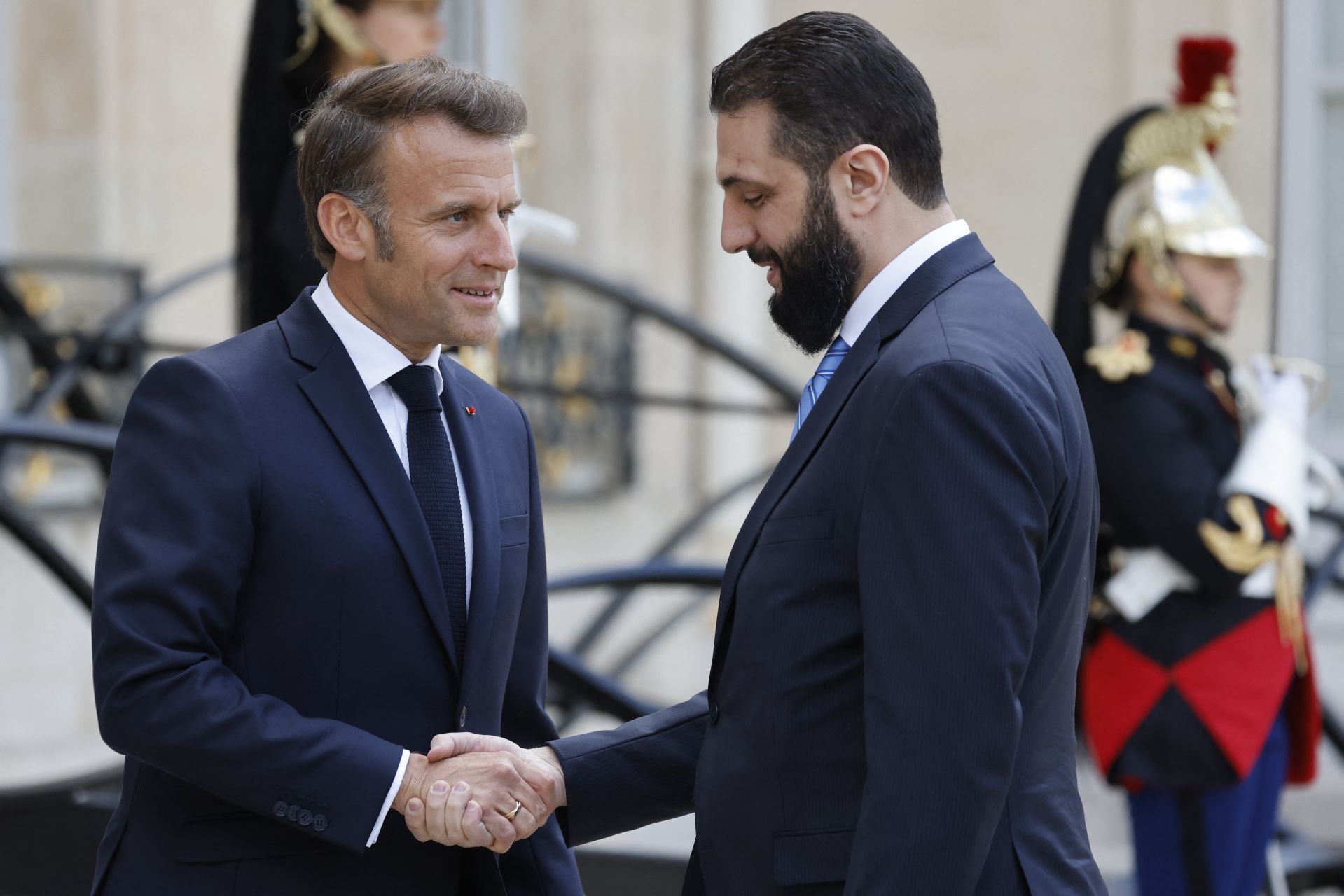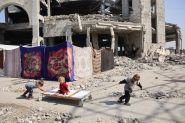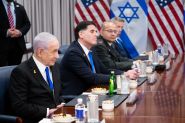- Home
- Middle East
- Syrian Leader Meets Macron in First European Visit

France's President Emmanuel Macron (L) greets Syrian interim President Ahmed al-Sharaa upon his arrival for their meeting at the Elysee presidential palace in Paris on May 7, 2025. ©SANA / AFP
Syrian President Ahmed al-Sharaa on Wednesday met French leader Emmanuel Macron on his first visit to Europe since overthrowing longtime ruler Bashar al-Assad, despite alarm over deadly clashes that have overshadowed the new authorities' first months in power.
Ahead of the high-profile talks at the Elysee Palace, Sharaa and his foreign minister met a whistleblower who helped document horrific torture under long-time ruler Bashar al-Assad.
Sharaa and Assaad al-Shibani "met with Farid al-Madhan, known as 'Caesar,'" the Syrian presidency said.
Sharaa and other top Syrian officials, who took power after the fall of President Assad in December, have roots in the Al-Qaeda jihadist network.
They are under pressure from Europe to show they are serious about protecting human rights as Damascus seeks the full lifting of Assad-era sanctions after 14 years of devastating war.
Madhan revealed his identity in February during an interview with broadcaster Al Jazeera. He fled Syria in 2013 with some 55,000 graphic images, including photographs showing emaciated bodies and people with their eyes gouged out.
The photographs inspired a 2020 US law that imposed economic sanctions on Syria and judicial proceedings in Europe against Assad's entourage.
In Paris with Macron, Sharaa will discuss post-war reconstruction and economic cooperation, a Syrian government official said.
"This meeting is part of France's historic commitment to the Syrian people who aspire to peace and democracy," the Elysee Palace said.
By welcoming Sharaa, Macron hopes to help the authorities on the way to "a free, stable, sovereign Syria that respects all components of Syrian society," a French presidential official told AFP.
The official said France was aware of "the past" of certain Syrian leaders and was demanding that there be "no complacency" with "terrorist movements" operating in Syria.
'Fight against Impunity'
"If we are inviting him (Sharaa) here, it is precisely to ask him to go further in the fight against impunity," Foreign Minister Jean-Noel Barrot told broadcaster TF1.
Sharaa headed the Islamist group Hayat Tahrir al-Sham (HTS), which spearheaded Assad's downfall after 14 years of civil war. The group formerly had links to Al-Qaeda.
He is still subject to a UN travel ban and France most likely had to request an exemption from the United Nations, as was the case for his recent trips to Turkey and Saudi Arabia, according to a source familiar with the matter.
France, a former colonial-era ruler of Syria, is eyeing an opportunity to increase its influence in the country after years of Russian presence, with French companies also seeking contracts.
Last week, French logistics giant CMA CGM signed a 30-year contract to develop and operate the port of Latakia.
Mehad, a French NGO that has operated in Syria since 2011, warned of a worsening humanitarian crisis in the country and called for "a strong response" from France.
"Emmanuel Macron's strong commitment must now be translated into action, not only by maintaining the budget allocated to humanitarian aid in Syria, but also by disbursing it quickly," said Mehad director Mego Terzian.
'Serious Error'
Syria's new Islamist authorities have vowed inclusive rule in the multi-confessional, multi-ethnic country.
But sectarian clashes in March, in which more than 1,700 people were killed, mostly among Assad's Alawite minority, sparked international condemnation and doubts over Syria's new path.
More recent clashes involving fighters from the Druze community and reports of abuses from NGOs have also raised doubts about the interim government's ability to control extremists in its ranks.
Adding to pressure on the new Syrian government, Israel has launched hundreds of strikes on the country since Assad's overthrow, including one near the presidential palace in Damascus on Friday.
The invitation for Sharaa has caused controversy in France, with far-right leader Marine Le Pen accusing Macron of hosting talks with "a jihadist" in a "provocative and irresponsible" meeting.
On the traditional right, the head of the right-wing Republicans in parliament, Laurent Wauquiez, denounced the meeting as "a serious error."
"We don't welcome leaders who are former terrorists and members of organizations that want to attack France," he said.
Barrot, who met the Syrian leader in Damascus in January, defended the talks and said that Paris was engaging in a "demanding" dialogue with Damascus.
"If Syria were to collapse today, if it were to break up, this would roll out the red carpet for Daesh," Barrot told TF1, using the Arabic acronym for Islamic State jihadists.
AFP
Read more



Comments